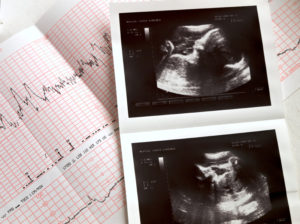My Third Trimester
Week 30
Estimated Reading Time: 3 minutes Wow! Thirty weeks have flown by. Your baby’s eyes are now open for a fair amount of the day. A hefty head of hair may be seen as well. Your baby’s bone marrow has red blood cells being produced within it. His or her brain is continuing to grow and mature; additional furrows and creases are noted on the exterior. This gives your baby’s tiny brain tissue the necessary space to increase as baby matures after birth.
Wow! Thirty weeks have flown by. Your baby’s eyes are now open for a fair amount of the day. A hefty head of hair may be seen as well. Your baby’s bone marrow has red blood cells being produced within it. His or her brain is continuing to grow and mature; additional furrows and creases are noted on the exterior. This gives your baby’s tiny brain tissue the necessary space to increase as baby matures after birth.
Your baby will perform breathing actions while moving his or her diaphragm steadily. Your tummy may shudder when this takes place.
Your baby is gaining weight and his or her frame is covered with a protective padding of fat.
Depression
 Antenatal (or Prenatal) Depression is depression during pregnancy. Not only is it common, it may also continue or newly manifest as Perinatal Mood And Anxiety Disorder (PMAD) which encompasses a wide range of mood disorders after delivery and up to a year after your baby is born. You may have signs of depression but not even be aware that you are depressed. It’s estimated that approximately 13 percent of pregnant women and new mothers experience depression.
Antenatal (or Prenatal) Depression is depression during pregnancy. Not only is it common, it may also continue or newly manifest as Perinatal Mood And Anxiety Disorder (PMAD) which encompasses a wide range of mood disorders after delivery and up to a year after your baby is born. You may have signs of depression but not even be aware that you are depressed. It’s estimated that approximately 13 percent of pregnant women and new mothers experience depression.
Every woman may have a few days where she feels sad, blue or down in the dumps. However with depression, the sad, anxious or empty feelings do not go away and your day-to-day routine and lifestyle changes because of these emotions. Your depression may present simply as feelings of unhappiness and gloom, or possibly spiral to feelings of overwhelming guilt, uncontainable hysteria or thoughts of inflicting harm on yourself or your baby
If you are feeling depressed during pregnancy or after having your baby, please realize that you are not alone and you are not to blame. With help you will feel like yourself again; don’t suffer alone. It is vital to recognize your symptoms and seek the help of a qualified professional before your condition intensifies.
Please tell a loved one and call your health care team right away!
To learn more about depression before, during and after pregnancy and a list of organizations ready to assist you, please visit or call:
- National Maternal Mental Health Hotline, Call or text 1-833-TLC-MAMA (1-833-852-6262).
- Womenshealth.gov
- 988 Suicide & Crisis Lifeline, Call or text 988.
- Postpartum Support Charleston, Support Warm Line 843-410-3585.
- Postpartum Support International, HelpLine: 800-944-4773, Text in English: 800-944-4773, Text en Español: 971-203-7773.
Additional Third Trimester Testing
 Around 30 weeks, speak with your health care team about the possibility of including two NSTs per week and one BPP with a Doppler Ultrasound every other week for the remainder of your last trimester. These vital check-ups will provide the opportunity to detect any problems, especially with your baby’s lifeline at this time: the placenta and umbilical cord. This foresight provides peace of mind for you and allows your health care team to make the right decisions for you and your baby.
Around 30 weeks, speak with your health care team about the possibility of including two NSTs per week and one BPP with a Doppler Ultrasound every other week for the remainder of your last trimester. These vital check-ups will provide the opportunity to detect any problems, especially with your baby’s lifeline at this time: the placenta and umbilical cord. This foresight provides peace of mind for you and allows your health care team to make the right decisions for you and your baby.